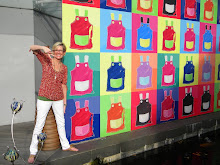 I’ve just returned from Ash Wednesday services at our Lutheran church here in Singapore. It’s very humbling to kneel at the altar and have the ashes placed on your forehead as the pastor says “Remember you are dust, and to dust you shall return.” Brings much-needed perspective in these times.
I’ve just returned from Ash Wednesday services at our Lutheran church here in Singapore. It’s very humbling to kneel at the altar and have the ashes placed on your forehead as the pastor says “Remember you are dust, and to dust you shall return.” Brings much-needed perspective in these times.Ash Wednesday is the beginning of the period of Lent. Below is a brief summary of Lent that I wrote last year for a chapel service. I’m still trying to decide what to give up as my sacrifice for the next forty days. I’ve realized I’m not so keen to bring any discomfort into my life.
Lent (from the Anglo-Saxon word lencten meaning “spring”) is a period of preparation preceding the celebration of the resurrection of Jesus at Easter. It consists of forty days, beginning on Ash Wednesday, but does not include the intervening six Sundays which are excluded because all Sundays are recognized as mini-Easters. The Lenten season, observed by prayer and fasting, is a time of repentance, sacrifice, and self-examination.
There is no Apostolic tradition for the season of Lent or for forty days of fasting, although there is a Biblical connection of forty days as a time of preparation (Ex 34:28, I Kings 19:8, Matthew 4:2). In the early church, every Friday was marked by fasting, and every Sunday by a celebration of the resurrection, a weekly observance of the Easter story. Believers would fast for forty hours (perhaps symbolic of the time Jesus laid in the tomb) prior to baptism.
As of the late-second century, there appear to be no concrete guidelines for the observance of Lent. Both Irenaeus and Tertullian write of much shorter periods, and both acknowledge the diversity of practices amongst the various churches. The first mention of forty days is at the time of the Council of Nicea (325 C.E.), and by the end of the fourth century, this period of time was more or less the accepted norm. Ash Wednesday, a day of penitence and purification, was instituted by Gregory the Great in 604 C.E. as the first day of Lent.
Fasting has been defined in various ways throughout the years. Some rules of fasting called for one small meal per day, usually after sundown. Small snacks were often allowed throughout the day for those required to do manual labor. All meat and animal products, including milk, butter, and eggs, were sometimes prohibited, a practice that led to the exchange of eggs at Easter. In the Middle Ages, some restricted items could be consumed by those who made monetary sacrifices to the church; hence, the nickname Butter Tower for the steeple of a medieval church that was constructed with the monies earned from these indulgences.
Today, as we enter this season of Lent, may we set aside time each day to reflect on our shortcomings, our failings, our need for a Saviour. As we realize the hopelessness of the situation if left to our own devices, we prepare our hearts for the tremendous outpouring of grace and forgiveness that God bestows upon us through Jesus.
He raises the poor from the dust and lifts the needy from the ash heap.
Psalm 113:7







